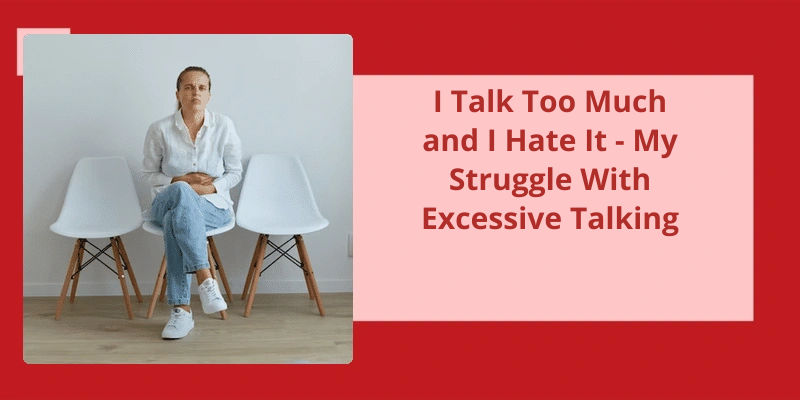As humans, our capacity for communication is our greatest strength. We’ve the ability to express our thoughts and emotions in ways that can inspire, inform, and entertain others. However, for some individuals, communication can be a double-edged sword. While some people may find it easy to express their thoughts and ideas, others may struggle with excessive talking that can often lead to feelings of embarrassment and frustration. In this regard, excessive talking can be a sign of anxiety, ADHD, or other psychological or neurological conditions. In this article, we explore the nature of excessive talking, it’s potential causes, and strategies to help individuals rein in their conversation habits.
Why Do Some Adults Talk So Much?
Other times, an individual might find it difficult to read social cues and doesn’t realize that he’s dominating the conversation. In some cases, an individual might be suffering from anxiety or ADHD, which can manifest as excessive talking. Whatever the reason, it can be frustrating for those around the talkative person.
Some people might feel uncomfortable in social situations and talk almost as a coping mechanism. They might feel like they need to keep the conversation going in order to avoid any awkward silences. Unfortunately, this can be exhausting for others and make them not want to engage with the talkative person.
Another reason that someone might talk too much is excitement. When some people get passionate about a topic, they can go on and on about it. While this can be enjoyable for the person sharing, it can become overwhelming for others who might not be as invested in the topic.
Someone might also talk excessively in an attempt to connect with others. They might feel like sharing their experiences or stories will make them more relatable and help others see them in a positive light. Unfortunately, this can backfire if the individual monopolizes the conversation, and others are unable to get a word in.
Whether it’s due to nerves, excitement, a desire to connect with others, or a lack of awareness about social cues, it’s important to be aware of how our behavior affects those around us. By being mindful of our speech and allowing others to contribute to the conversation, we can create more enjoyable and meaningful social interactions.
Is It Normal to Feel Annoyed When Someone Talks Too Much?
It’s important to note that feeling annoyed when someone talks too much is a very normal human emotion. It’s certainly frustrating when someone dominates a conversation or doesn’t give others a chance to speak. It’s also understandable to feel like the person is wasting your time or not respecting your boundaries.
However, it’s also important to be mindful of why were feeling annoyed. Sometimes, it might be a result of our own mood or stress levels. Maybe were feeling overwhelmed or anxious, and any extra noise or conversation just feels like too much to handle. Other times, it might be a result of the other persons behavior. Perhaps they really are being obnoxious and not giving others a chance to speak.
Either way, it’s important to try to keep our irritation in check and communicate our feelings in a mature and respectful way. Sometimes, the other person might not even realize that theyre talking too much or monopolizing the conversation. By gently bringing it to their attention, you might be able to find a better balance and have a more enjoyable conversation.
It’s also helpful to consider the context of the conversation. Is this a casual social gathering where people are just catching up and chatting? Or is it a more formal or business setting where everyone should have an opportunity to share their thoughts and ideas? Understanding the expectations and norms of the situation can help us manage our own emotions and reactions.
We all have our own preferences and boundaries when it comes to conversation and social interaction. The key is to be mindful of our own emotions and considerate of others, so that we can find a balance that works for everyone involved.
Source: Is it normal for me to get angry when someone talks too much?
If you’re someone who tends to dominate conversations and can’t seem to stop compulsively talking, there are a few things you can do to help yourself. One simple but effective approach is to make a conscious effort to keep conversations balanced and avoid interrupting others. By asking questions and actively listening to other people’s responses, you can create a more respectful and engaging dialogue that gives everyone a chance to participate. Of course, breaking old habits can be challenging, but with a bit of focus and dedication, you can learn to be a better communicator and a more considerate conversationalist.
How Do I Stop Compulsive Talking?
If you find yourself constantly talking without giving others a chance to speak, you may be struggling with compulsive talking. This can be a frustrating experience for both you and the people around you. Fortunately, there are steps you can take to stop compulsive talking and improve your social interactions.
One of the most important things you can do is to keep conversations balanced. This means giving others the opportunity to speak and share their thoughts. It also means avoiding dominating the conversation with your own experiences or opinions. Instead, try to ask questions that encourage others to share their experiences and perspectives.
Another key strategy is to listen actively when others are speaking. Rather than thinking about what you want to say next, focus on what the other person is saying. This means paying attention to their tone, body language, and the content of their words. If you find your mind wandering, make a conscious effort to refocus on the conversation at hand.
It’s also important to be patient and avoid cutting in as soon as conversations come to a pause. Give others a chance to collect their thoughts and respond in their own way. Interrupting can be perceived as rude and may cause others to feel unheard or disrespected.
Finally, always avoid interrupting when someone else speaks. This is a behavior that can be frustrating and alienating to others. If you find yourself struggling to hold back, take a deep breath, and remind yourself to wait for your turn to speak.
However, by following these strategies, you can improve your social interactions and build stronger, more positive relationships with those around you.
Conclusion
In conclusion, it’s important to recognize the value of moderation in communication. Taking the time to actively listen and engage in dialogue can’t only improve relationships, but also create a more fulfilling and enriching experience for all parties involved. Additionally, individuals who struggle with speaking too much may benefit from exploring the root causes of their behavior and finding ways to combat it, such as developing self-awareness and actively practicing restraint. Ultimately, finding a balance between speaking and listening is key to achieving effective communication and maintaining healthy interactions with others.






